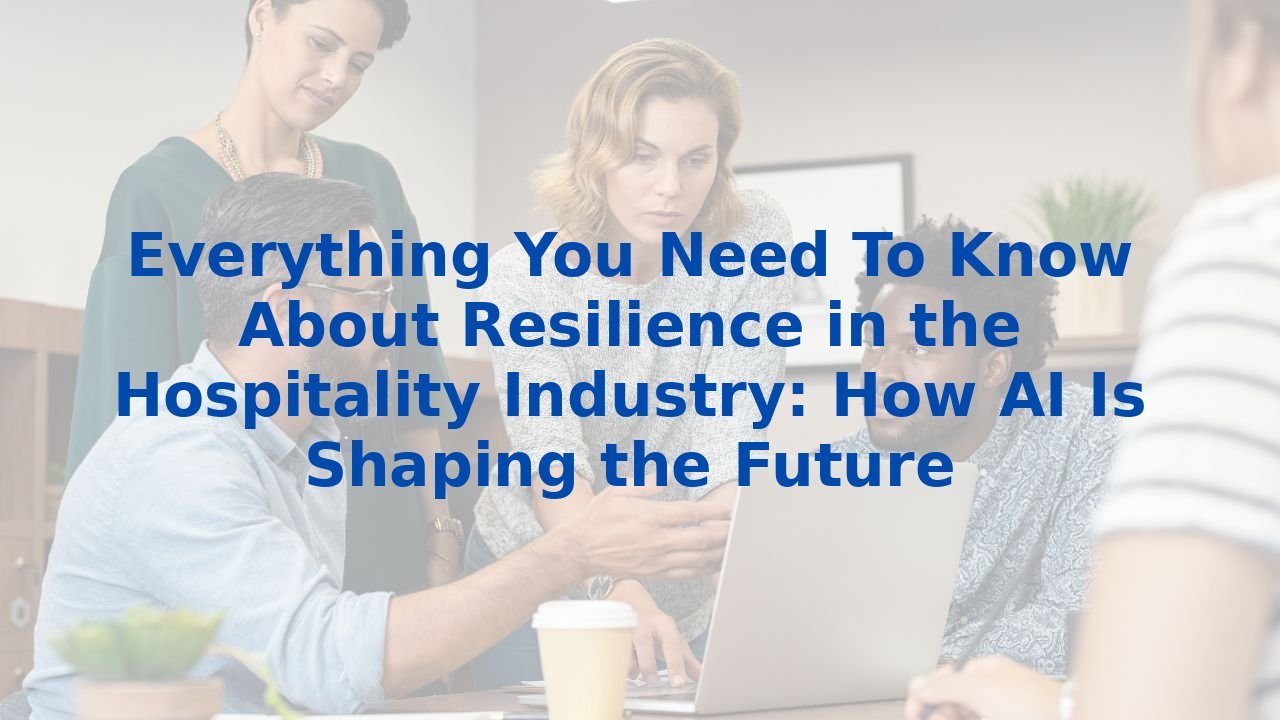Everything You Need To Know About Resilience in the Hospitality Industry: How AI Is Shaping the Future
Everything You Need To Know About Resilience in the Hospitality Industry: How AI Is Shaping the Future
The hospitality industry has long been a beacon of resilience, thriving through economic fluctuations and global challenges. As we look forward, one undeniable force is shaping its future: artificial intelligence (AI). This transformative technology is upgrading the way businesses operate, enhancing efficiency, and elevating guest experiences to unprecedented levels. Let’s delve into how AI is redefining processes in the hospitality sector and the benefits it brings along.
Enhancing Guest Experiences with AI
A remarkable area where AI excels is in the enhancement of guest experiences. Imagine walking into a hotel where everything is tailored just for you. AI technology makes this a reality.
Personalized Services
AI-driven guest profiling empowers hotels to deliver personalized experiences. By harnessing data, hotels can offer services and recommendations that resonate with each guest's unique preferences. Instant assistance through chatbots and virtual assistants further enriches guest satisfaction, resulting in lasting loyalty.
Smart Room Technology
With AI-powered smart rooms, several unique features await guests. By analyzing historical data and individual preferences, these rooms suggest tailored activities, nearby attractions, and amenities, enhancing comfort and convenience during their stay.
Pre-Arrival Personalization
AI does not stop at enhancing the on-site experience. Prior to arrival, it gathers insights on guest preferences, leading to tailored recommendations that set the stage for a memorable visit. This proactive approach fosters loyalty and inspires positive reviews long before guests check in.
Streamlining Operations with AI
Operational efficiency in hotels can be significantly enhanced through AI, allowing staff to focus on what really matters: connecting with guests.
Automated Tasks
From booking management to contactless check-in procedures, automation of repetitive tasks empowers hotel staff to engage in more strategic activities. This, in turn, cultivates stronger relationships with guests by ensuring each interaction is meaningful and personal.
Data Management
Handling data can feel overwhelming in the hospitality landscape. AI simplifies this challenge by collecting and analyzing data across numerous systems. This capability enables hotels to turn raw data into actionable insights that streamline operations and anticipate guest needs.
Predictive Maintenance
Another remarkable feature of AI is its ability to anticipate maintenance needs before they escalate into issues for guests. By employing predictive maintenance, hotel staff can ensure seamless operations and a smooth experience for guests, avoiding the dreaded downtimes.
Optimizing Revenue Management
AI’s impact isn't limited to enhancing guest experiences; it also plays a crucial role in maximizing revenues.
Dynamic Pricing Strategies
With sophisticated AI-driven algorithms analyzing market conditions and guest behaviors, hotels can implement targeted pricing strategies that maximize occupancy and profitability. This agility is especially crucial during fluctuating seasons.
Inventory Management
AI also excels at predicting booking cancellations and occupancy patterns. By optimizing room inventories based on insights gathered, hotels can effectively manage availability, reducing revenue losses while maximizing resource utilization.
Ensuring Security and Safety
In a time when safety is paramount, AI-powered surveillance systems enhance security measures within hotel premises.
AI-Powered Surveillance Systems
These systems are equipped to detect potential threats and notify staff in real-time, enhancing guest safety. Innovations such as facial recognition technology simplify and streamline check-in processes while ensuring effective identification of guests.
The Benefits of Training Employees for AI
It’s not just about having AI technologies in place; it’s also about ensuring that employees are trained to harness these tools effectively.
Enhanced Skills
Equipping staff with AI training enhances their ability to integrate these technologies into daily operations, from utilizing chatbots to managing guest requests more efficiently. This skillset not only improves customer service but also streamlines processes throughout the establishment.
Adaptability
In a fast-paced industry, adaptability is key. Employees trained in AI are better positioned to meet evolving guest expectations and rapidly changing technological landscapes. This adaptability ensures businesses can continue to thrive, even amidst uncertainty.
Conclusion
Integrating AI into the hospitality industry is not just an option; it's a necessity for enhancing efficiency, improving guest experiences, and building a robust operational framework. By automating repetitive tasks, personalizing services, optimizing revenue, and implementing safety measures, hotels can not only survive but thrive in the face of future challenges. Moreover, investing in AI training for employees is essential for maximizing these benefits, ensuring the hospitality industry stays ahead of the curve in an ever-evolving landscape.



